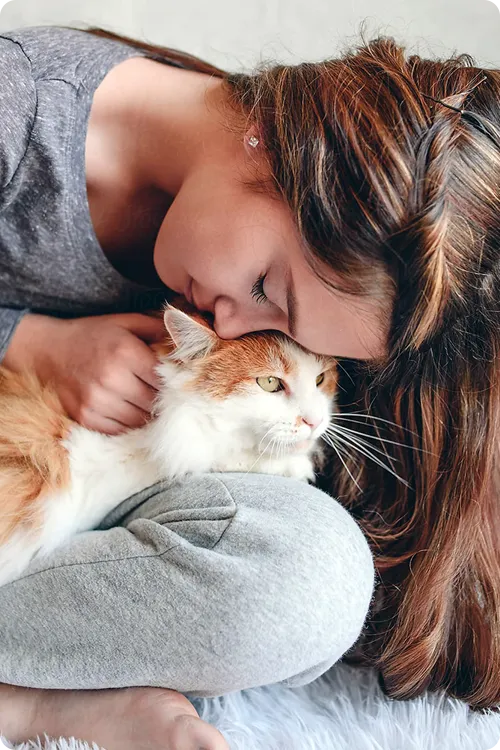Do you cover parvo, giardia, or kennel cough?
Yes, parvo, Giardia, and kennel cough are all covered health conditions with your Trupanion policy, with a few important caveats. We do require that these conditions are not pre-existing, that all recommended or required vaccinations are current, and that preventative measures have been taken.
Please note that these are very serious illnesses that young pets (puppies and kittens) are particularly at risk of contracting — especially when it comes to parvo and kennel cough. All are highly contagious conditions that require urgent veterinary attention. So, while your Trupanion policy does cover parvo, Giardia, and kennel cough, it’s still important to become familiar with each one and know the risks posed to your pet.
What is parvo?
Canine and Feline Parvovirus (CPV and FPV)— more commonly known as "parvo" — is a highly contagious illness that is commonly associated with puppies and kittens who have been exposed to it in shelters and kennels or taken to public spaces like dog parks before vaccination. Parvo can be fatal, especially to younger pets who have not been vaccinated for it, making it one of the most serious conditions covered by pet insurance.
However, both dogs and cats need to be protected through vaccination and treated quickly if the condition is suspected. Getting your young pet the care they need to recover quickly is essential, which is why pet insurance that covers parvo is so important.
What is Giardia?
Giardiasis is an infection caused by Giardia, a protozoan parasite that is commonly seen in dogs who consume fecal contaminated food, water, or soil. However, cats can get it too. Unlike parvo, Giardia is a parasitic infection that, while uncomfortable and potentially serious, typically responds well to treatment when caught early. Also, dogs with other GI parasites or illnesses (such as a chronic enteropathy) can have more severe clinical signs.
Pets with Giardia can inadvertently spread Giardia to humans, especially those in the same household, though this transmission is relatively rare. Giardia generally causes diarrhea, abdominal pain, stomach upset, and weight loss, but it may also result in more serious symptoms. Signs and symptoms tend to be more visible in younger pets and can come on suddenly (acute), be temporary (transient), non-continuous (intermittent), or ongoing (chronic) if left untreated.
What is kennel cough?
Kennel cough or canine infectious respiratory disease (CIRD) is a highly contagious illness that can affect both dogs and cats. Several viral and bacterial pathogens are associated with CIRD, and one or more pathogens may be involved in each affected dog. Prevalence of various pathogens involved in CIRD differs based on the geographical area.
Kennel cough causes sneezing, coughing and oculonasal discharge and can be spread by direct dog to dog contact or via contaminated fomites, making it particularly common in areas where pets congregate.
Most cases of kennel cough are mild and fortunately clear up on their own within a couple weeks. However, the condition can become serious and may even be fatal if it progresses to pneumonia. Puppies, unvaccinated dogs and immunocompromised pets are at higher risk of experiencing serious complications from kennel cough, similar to the increased vulnerability seen with parvo.
Risk factors for parvo, Giardia, and kennel cough
Understanding which pets are most at risk helps pet parents make informed decisions about prevention. All breeds are susceptible, but puppies are at increased risk due to their still developing immune systems. This makes robust pet insurance coverage even more critical during these formative months when pets are most susceptible. Similarly, immunosuppressed dogs are at a higher risk for more severe disease.
Crowded conditions, such as can occur in kennels or animal shelters or dog parks, create the perfect environment for transmission of all three conditions. The likelihood of developing disease increases when a pet is stressed or when the environment is contaminated with fecal material.
Diagnosing and treating early is key
Diagnosing these conditions can be more complex than many pet parents realize, which is another reason why professional veterinary care is essential. Because Giardia cysts can be shed intermittently in the stool, they might not be seen on a single stool sample. This means your veterinarian may need to perform multiple tests or use specialized diagnostic methods to confirm the presence of the parasite.
Trupanion covers the cost of eligible diagnostic testing when clinical signs are present, which is the only way to determine whether your dog has a Giardia infection or a different health concern. Professional veterinary testing is essential for accurate diagnosis and appropriate treatment of all three conditions.
Treatment and costs
Treatment for these conditions often involves multiple components that can quickly become costly. For dogs symptomatic for Giardiasis, typical treatment includes antiparasitic and/or an antiprotozoaldrugs. A special GI supportive diet may also be recommended. Additionally, dogs should be fully bathed on the last day of treatment to remove fecal material and any remaining Giardia cysts in the dog's fur.
Hospitalization may be necessary for any of these conditions, but particularly with parvo to treat associated dehydration and electrolyte imbalances, prevent secondary bacterial infections, provide pain control, control vomiting, provide nutritional support and treat any secondary complications.
While antibiotics or antivirals are often not necessary to treat kennel cough, in some cases they are recommended. Supportive care may include a cough suppressant or nebulization.
Environmental contamination and prevention
One of the most challenging aspects of managing these conditions is preventing reinfection through environmental contamination. Giardia cysts are hardy and can survive in the surrounding environment for months, and they are instantly infectious, meaning just a few ingested cysts can cause infection.
Proper and prompt cleaning becomes crucial for preventing reinfection. Common household disinfectants and steam-cleaning are the most effective ways for killing Giardia cysts. Pet parents must thoroughly clean all surfaces, including scrubbing hard surfaces with soap, then disinfecting using bleach and water (3/4 cup of bleach per one gallon of water). Upholstered furniture and carpets require steam cleaning at specific temperatures to ensure complete disinfection.
If the environment is not properly disinfected, parvo can persist for months to years. Isolating sick pets and keeping your pet up-to-date on their vaccines is key to controlling kennel cough and preventing parvo infection.
Are these conditions contagious to humans?
An important consideration that many pet parents overlook is the potential for transmission to humans. Giardia is a zoonotic parasite, which means that it can be transmitted to humans. However, the type of Giardia that normally infects humans differs from the type that infects dogs and cats, making it rare for humans to get infected from a strain that pets may carry.
Despite this lower risk, proper hygiene practices are essential during treatment and recovery. Always wash your hands thoroughly after handling your pet or cleaning up after them and ensure that all family members understand the importance of these precautions. Children and immunocompromised individuals are at higher risk for infection and should be kept away from pets with Giardiasis.
The importance of pet insurance for parvo, Giardia, and kennel cough
Parvo, Giardia, and kennel cough can all be serious conditions, especially if not treated in a timely manner. They are also unpredictable and can manifest differently in individual pets, meaning some dogs and cats may require extensive, complex veterinary treatment while others will recover more quickly. There's no way to tell exactly how parvo, kennel cough, or Giardiasis will affect your pet or when, so it's best to be prepared ahead of time with a comprehensive pet insurance plan.
When pets fall ill with any of these conditions, it can be scary trying to decide on the best treatment plan while also managing a household budget. With Trupanion pet insurance, we take the stress out of caring for your dog or cat with no payout limits and up to 90% coverage so you can focus on their recovery. Our robust lifetime coverage for new, unexpected illnesses gives you access to the best pet health care offered by any licensed veterinarian of your choice in the US, Canada, and Puerto Rico. We're here for you when you need it most — today and every day.
Related questions

Get the care your best friend deserves
From lovable mutts to specific breeds, we provide medical coverage that’s with you from the adorable puppy years to those sweet, sunset moments.
